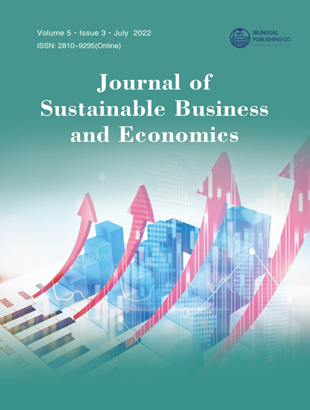-
227
-
187
-
144
-
138
-
134
Taxation in a Decentralized Value Added Tax Regime: Implications for States in Nigeria
DOI:
https://doi.org/10.30564/jsbe.v5i3.18Abstract
The study examined the implication of a decentralized Value Added Tax system for states in Nigeria. It is a theoretical presentation that made is made of journals, articles, and data from the National Bureau of Statistics (NBS) accessed on Google Scholar Websites. A total of eighty (80) articles were accessed. Results from a theoretical review revealed that while few states in Nigeria are in favor of a decentralized VAT administration in the country, quite a number of them (States) are averse to the new VAT regime due to differences among the states in terms of volume of business activities and economic power as many of the states rely on federal allocation. The study, therefore, recommends Partial Decentralization (PD) of VAT administration in Nigeria as a measure of autonomy for states that will guarantee fairness in resource control in the Nigerian Society.
Keywords:
Taxation; Value added; Administration; Resource; Control; DecentralizedReferences
[1] Darlmon, S.M., Richard, I.U., 2015. Taxation and economic development of developing nations. Journal of Finance and Development. 4(1), 231-242.
[2] Larry, S., Morle, A., 2016. Empirical analysis of value added tax on and revenue generation. Journal of Finance and Business Management. 4(2), 134-145.
[3] Manma, N., Hashfu, O., 2021. Impact of fiscal policy on micro and macroeconomic growth. Journal of Innovative Research in Management and Accounting. 1(3), 52-63.
[4] Osita, A., 2011. Taxation and Tax Management in Nigeria 5th (ed) Enugu Meridian Associates Publishers.
[5] Mokolu, D., Ogodor, W.T., 2021. Value added tax and revenue growth: Evidence from Nigeria. Journal of Accounting and Finance. 2(4), 101-112.
[6] Yaluwa, N.I., 2015. Value added tax: progressive, proportional or regressive? Journal of Accounting and Entrepreneurship. 3(4), 69-82.
[7] Ebungor, F., Doglas, R., 2018. Enduring solutions to endless revenue sharing agitations in Nigeria. Social and Economic Review. 3(4), 105-116.
[8] Udah, B., Oyinlola, H.S., 2019. Towards sustainable development in Nigeria. Journal of Entrepreneurship Development. 1(2), 19-31.
[9] Kartom, P.A., Duke, M., 2017. The politics of resource control agitations across nations. Journal of Economics and Trade Relations. 3(1), 111-123.
[10] Armstrong, A.B., Arthur, O.T., 2018. The relationship between value added tax and economic growth. Journal of Management, Economics and Entrepreneurship Studies. 2(2), 74-86.
[11] Okoli, E.B., 2015. Impact of Value added tax on national revenue. An ECM model. Journal of Finance and Entrepreneurship Studies. 2(2), 91-103.
[12] Apere, T.O., Durojaye, O.J., 2016. Impact of value added on government revenue in Nigeria. International Journal of Management and Applied Science. 2(7), 92-97.
[13] Onochie, O.A., Nkiru, N.A., Anayo, R., 2018. Value added tax and size of Nigeria’s total revenue: A co-relational investigation. Journal of Economy and Management. 2(1), 14-26.
[14] Disu, O., Haliru, E., 2019. The positivity of value added tax revenue. Journal Social Politics and Economic Studies. 2(1), 28-40.
[15] Sylvester, O., Sunday, A.O., 2018. Resolving revenue allocation challenges. The American Economist. 64(1), 142-153.
[16] Enefola, O.C., Tajudeen, G.M., 2019. Nigeria’s fiscal responsibility and revenue allocation issues: The way forward. Journal of Business and Management Research. 2(4), 39-51.
[17] Frank, D., Nduche, A., 2020. Micro and Macro economic impact of Value added tax in Nigeria. Journal of Advances in Economics and Management Science. 1(3), 85-97.
[18] Edhu, H., Ellias, C.C., 2016. Revenue allocation and growth of Nigerian economy. An empirical investigation. Journal of Administration and Social Ecience. 2(3), 47-58.
[19] Umanah, F.C., Ekpo, T., 2017. The relationship between revenue structure and development. An empirical evidence. Journal of Policy Studies. 2(4), 224-236.
[20] Ekola, K., Teslim, I.T., 2019. Contribution of indirect tax to growth of Nigerian economy. Journal of Politics, and Economic Studies. 5(2), 61-73.
[21] Desmond, B.U., Hamstron, W., 2020. Impact of value added tax on growth and development. Journal of Accounting, Economic and Political Science. 2(4), 29-41.
[22] Digboru, P., Ochima, D., 2019. The role of value added tax in micro and macro economic growth. Journal of Tax and Economy. 1(1), 31-43.
[23] Emulefor, G.K., Ayo, A.A., 2020. Economic stimulation in Nigeria via decentralized value added tax administration. Review of Management and Economy. 2(3), 104-116.
[24] Ukalor, A.B., Onya, E., 2020. The relationship between revenue growth and effect of Value added tax influence: Evidence from Nigeria. Journal of Business and Management Research. 1(5), 127-140.
[25] Neigbogu, T.N., Tobi, L.K., 2021. Value added tax and revenue growth in Nigeria: A theoretical exposition. Journal of Social and Applied Science. Journal of Finance and Business. 1(1), 13-26.
[26] Wedler, R.B., Daslon, G., 2015. Value added tax and microeconomic growth. Journal of Taxation and Business. 2(1), 33-45.
[27] Barilon, B., Rofman, D.S., 2015. Value added tax: A significant contributor to finance of nations. Journal of Political Development and Economy. 3(4), 107-121.
[28] Menda, T.S., 2019. Revenue relevance of value added tax in an economy: An empirical analysis. Journal of Management Studies and Entrepreneurship Research. 2(1), 206-219.
[29] Samuel, O., 2021. Lagos, Kano, Oyo dwarf other states share N1.84 trillion from vat revenue. Available at http://nairametrics.com>news.
[30] Williams, A.B., Adeoye, O., 2020. Do Value added tax structure influence public expenditure pattern in Nigeria? Journal of Management and Finance. 2(3), 42-53.
[31] Ogor, K.H., Kelechi, N., 2019. Value added tax administration and issues of resource control in Nigeria. Journal of Economics and Humanities. 1(1), 82-93.
[32] Uta, A.M., Enulema, D.E., 2021. Effects of Value added tax on productivity in Nigeria. Journal of Business and Economics. 1(3), 87-98.
[33] Okheighbe, L.B., Behlewa, S.V., 2020. Fiscal federalism and issues of development in Nigeria. Journal of Business and Financial Studies. 4(2), 49-61.
[34] Chekwue, E., Otule, H.R., 2019. Value added tax and revenue growth in Nigeria. Journal of Entrepreneurship and Finance. 2(4), 49-62.
Downloads
How to Cite
Issue
Article Type
License
Copyright © 2022 Sani Alfred Ilemona, Sunday Nwite

This is an open access article under the Creative Commons Attribution 4.0 International License.




 Sani Alfred Ilemona
Sani Alfred Ilemona


